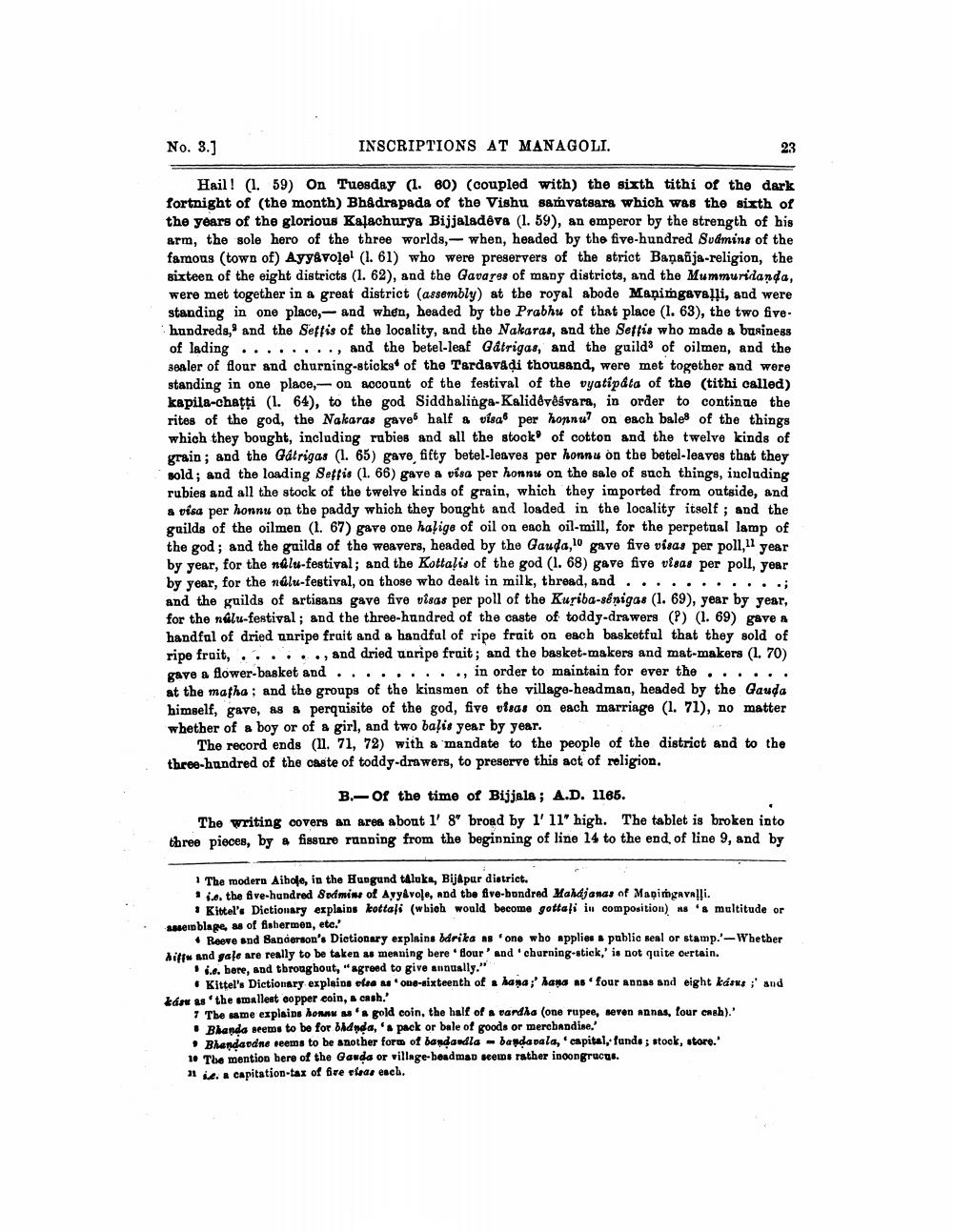________________
No. 3.]
INSCRIPTIONS AT MANAGOLI.
23
Hail! (1.59) On Tuesday (1.60) (coupled with) the sixth tithi of the dark fortnight of the month) Bhadrapada of the Vishu samvatsara which was the sixth of the years of the glorious Kalachurya Bijjaladêve (1. 59), an emperor by the strength of his arm, the sole hero of the three worlds, when, headed by the five hundred Sudmins of the famous (town of) Ayyavolel (1. 61) who were preservers of the strict Banaõja-religion, the sixteen of the eight districts (1. 62), and the Gavares of many districts, and the Mummuridanda, were met together in a great district (assembly) at the royal abode Mapimgevalli, and were standing in one place,- and when, headed by the Prabhu of that place (1. 63), the two fivehundreds, and the Seffis of the locality, and the Nakaras, and the Settis who made a business of lading ........, and the betel-leaf Gátrigas, and the guilds of oilmen, and the sealer of four and churning-sticks of the Tardavåời thousand, were met together and were standing in one place, on account of the festival of the vyatipata of the tithi called) kapila-chatti (1. 64), to the god Siddhalinga-Kalidêvêśvara, in order to continue the rites of the god, the Nakaras gave half & visa® per hornu? on each bales of the things which they bought, including rabies and all the stock of cotton and the twelve kinds of grain; and the Gátrigas (1. 65) gave fifty betel-leaves per honnu on the betel-leaves that they bold; and the loading Seffis (1.66) gave a vísa per honnu on the sale of such things, including rubies and all the stock of the twelve kinds of grain, which they imported from outside, and a visa per honnu on the paddy which they bought and loaded in the locality itself; and the guilds of the oilmen (1. 67) gave one halige of oil on each oil-mill, for the perpetual lamp of the god; and the guilds of the weavers, headed by the Gauda, lo gave five visas per poll, 12 year by year, for the nalu-festival; and the Kottaļis of the god (1. 68) gave five visas per poll, year by year, for the núlu-festival, on those who dealt in milk, thread, and ...........; and the guilds of artisans gave five visas per poll of the Kuriba-sênigas (1. 69), year by year, for the nglu-festival; and the three-hundred of the caste of toddy-drawers (?) (1. 69) gave a handful of dried unripe fruit and a handful of ripe fruit on each basketful that they sold of ripe froit, ......, and dried unripe fruit; and the basket-makers and mat-makers (1. 70) gave a flower-basket and ........., in order to maintain for ever the ...... at the matha; and the groups of the kinsmen of the village-headman, headed by the Gauda himself, gave, as a perquisite of the god, five visas on each marriage (1. 71), no matter whether of a boy or of a girl, and two balis year by year.
The record ends (11. 71, 72) with a mandate to the people of the district and to the three-hundred of the caste of toddy-drawers, to preserve this act of religion.
B.-of the time of Bijjala; A.D. 1165. The writing covers an area about 1' 8" broad by 1' 11" high. The tablet is broken into three pieces, by a fissure running from the beginning of line 14 to the end of line 9, and by
1 The modern Aihole, in the Hungund taluka, Bijapur district. 11. the five-hundred Sudmine of Ayyavole, and the five-hundred Mahdjanas of Mapingavalli.
Kittel's Dictionary explains leottali (which would become gottali in composition) ns & multitude or assemblage, as of fishermen, etc.'
Roove and Sanderson's Dictionary explains bdrika as one who applies public real or stamp.'-Whether hitts and gale are really to be taken as meaning bere flour' and 'churning-stick,' is not quite certain.
1.. bere, and throughout, "agreed to give annually."
• Kittel's Dictionary explains ofta as one-sixteenth of a hana;' hand as four Annas and eight kdons ;' and kást as the smallest copper coin, a cash.'
7 The same explains hows a gold coin, the half of a vandha (one rupee, seven Annas, four cash).' • Bhanda seems to be for bdnda, 'pack or bale of goods or merchandise.' • Bhandardne seems to be another form of bandandla - bandavala, capital, fundo; stock, store.' 1. The mention here of the Ganda or village-boadmap seems rather incongrucus. 11 i. a capitation-tax of five citar esch.




